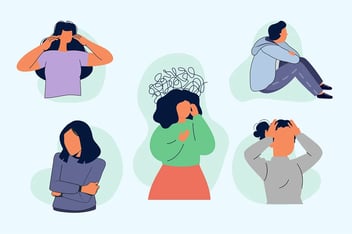Hypnotherapy: Unlocking the Benefits of Hypnosis in Therapy

Hypnotherapy uses hypnosis to help treat specific symptoms or health conditions. By creating a hypnotic state with heightened awareness and focused attention, it can help people address issues like phobias, anxiety disorders, pain, weight loss, and smoking cessation.
Although formal studies on the therapeutic uses of hypnosis began in the late 1700s, it has only gained scientific credibility more recently. Modern research continues to explore its effectiveness compared to other treatments.
Contrary to the image of a stage magician swinging a pocket watch, therapeutic hypnosis involves guided visualisations and relaxation. This helps individuals block out distractions, focus on their issues, and learn coping skills. Hypnosis, an old technique, has seen renewed interest along with other alternative mental health therapies.
Hypnotherapy Techniques
During a hypnotherapy session, individuals are guided into a trance-like state to help them focus, respond to suggestions, and relax deeply. This heightened awareness is used to address problems more effectively. Hypnotherapy techniques include:
- Relaxation: Visualise peacefulness and relaxation, even when facing fears or problematic behaviours.
- Suggestion: Gentle behaviour change suggestions to help overcome issues, like seeing yourself as a supportive advisor during a phobic reaction.
- Coping skills: Learn cognitive-behavioural techniques, such as guided imagery and the STOP technique, to deal with fears or anxieties.
- Exploration of past experiences: Discuss the first time you encountered the behaviour or problem and your feelings.
What Hypnotherapy Can Help With
There are many reasons someone might try hypnotherapy. Research suggests it can help with:
- Chronic pain
- Dementia symptoms
- Nausea and vomiting from chemotherapy
- Pain during childbirth, dental procedures, or surgery
- Skin conditions like psoriasis and warts
- Irritable bowel syndrome (IBS) symptoms
- ADHD symptoms
Licensed physicians and psychologists may use hypnotherapy to treat anxiety disorders, depression, eating disorders, and PTSD. It can also help change or reduce problematic behaviors, such as quitting smoking, losing weight, and improving sleep.
Benefits of Hypnosis as a Part of Therapy
Hypnotherapy can have varying effects; some people experience dramatic results, while others feel very relaxed. Benefits of hypnotherapy include:
- Awareness: Some people stay fully aware and remember everything, while others may feel deeply relaxed and detached.
- Focus: It helps you overcome daily distractions and worries, allowing you to concentrate fully on the issue.
- Relaxation: In a hypnotic state, you become deeply relaxed, with a quieted conscious mind, making you calmer and more receptive to addressing your problems or fears.
- Reassurance: Hypnotherapists often use calming messages like "you are safe" and "no one can harm you" to help clients face their issues objectively without panic.
- Behavioural Change: It can help change or reduce problematic behaviours, such as quitting smoking or losing weight.
- Symptom Management: It can help manage symptoms of various conditions like chronic pain, IBS, and ADHD.
Does Hypnotherapy Work?
The effectiveness of hypnotherapy varies depending on the individual and how it's used. It has shown some efficacy for specific applications, particularly:
- Pain reduction during dental procedures and childbirth
- Reducing nausea and vomiting from chemotherapy
- Alleviating symptoms of irritable bowel syndrome (IBS)
Hypnotherapy can help with stress and anxiety but is often best used alongside treatments like cognitive behavioral therapy (CBT) and medications. A study published in the issue of the Journal of Affective Disorders found hypnotherapy to be as effective as CBT for treating mild to moderate depression. CBT led to a 38.5% reduction in symptoms, while hypnotherapy resulted in a 44.6% reduction. As research continues, hypnotherapy may become more widely accepted for treating various conditions.
Warnings
While hypnotherapy is generally safe and well-tolerated, there are some potential risks:
- False or Distorted Memories: Hypnotherapy can sometimes create false or distorted memories, which may impact the accuracy of personal recollections.
- Decreased Personal Control: Highly suggestible individuals may experience a reduced sense of personal control while hypnosis, making them more vulnerable to suggestions.
- Side Effects: Some people may experience side effects such as anxiety, headaches, or dizziness during or after a hypnotherapy session.
- Unsuitability for Psychosis: Hypnotherapy may not be appropriate for individuals experiencing symptoms of psychosis, such as hallucinations and delusions, as it could exacerbate these conditions.
Given these risks, it is crucial to consult your doctor before trying hypnotherapy. Ensure you undergo hypnotherapy only under the supervision and guidance of a qualified professional to minimize potential risks and ensure safety.
Common Misconceptions
Hypnotherapy remains controversial, with many mental health professionals questioning its effectiveness. Several myths and misconceptions can affect how people view this therapeutic tool:
- Confusion with Stage Hypnosis: Hypnotherapy is often mistaken for stage hypnosis, where performers read people well and select extroverts to entertain the audience. Whether these subjects are genuinely hypnotized is debatable.
- Memory: Unlike the myth, hypnotherapy doesn't make you forget what happened. You remain aware, not asleep or unconscious, and can break the hypnotic trance anytime.
- Control: You won't lose power during hypnotherapy. You remain in charge of your actions, behaviors, and statements and cannot be forced to do anything against your will. You may focus intensely on the session and not on your surroundings, but you are always in control.
- Intelligence: Being hypnotizable doesn't mean you are less intelligent. Most people can be hypnotized to some degree, with only about 10% finding it difficult or impossible.
How to Get Started
To find a reputable hypnotherapist, consider several approaches. Start by asking friends or acquaintances who have undergone hypnotherapy about their experiences. Your mental health practitioner might also be licensed to perform hypnotherapy or know a qualified professional. However, be aware that some hypnotherapists specialize in specific issues, so a therapist recommended by a friend might not be the best fit for you. Discuss the option of hypnotherapy with your healthcare provider to see if they recommend it. Also, check with your insurance company to confirm whether hypnotherapy is covered under your plan. Additionally, you can search for certified hypnotherapists online using the National Board for Certified Clinical Hypnotherapists database, which includes up-to-date information on practitioners in the United States, Great Britain, and parts of Europe.




